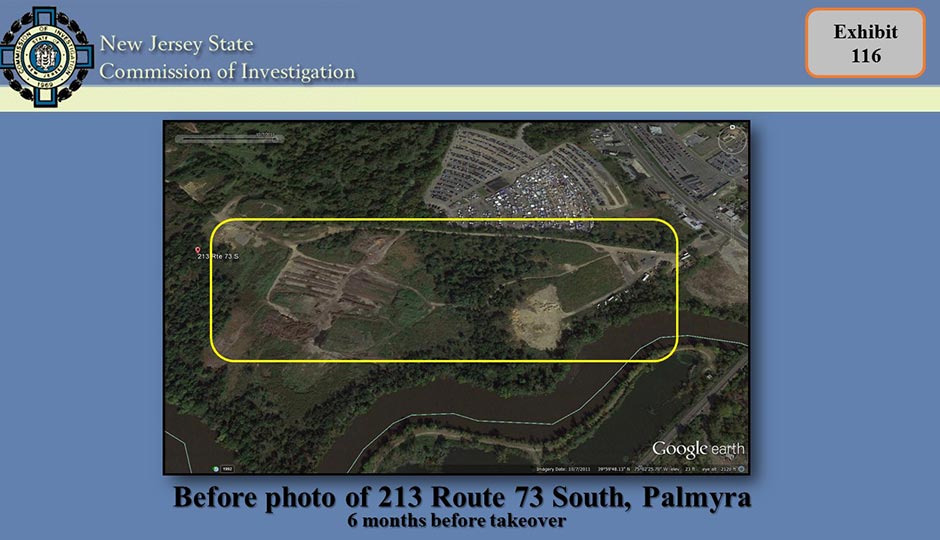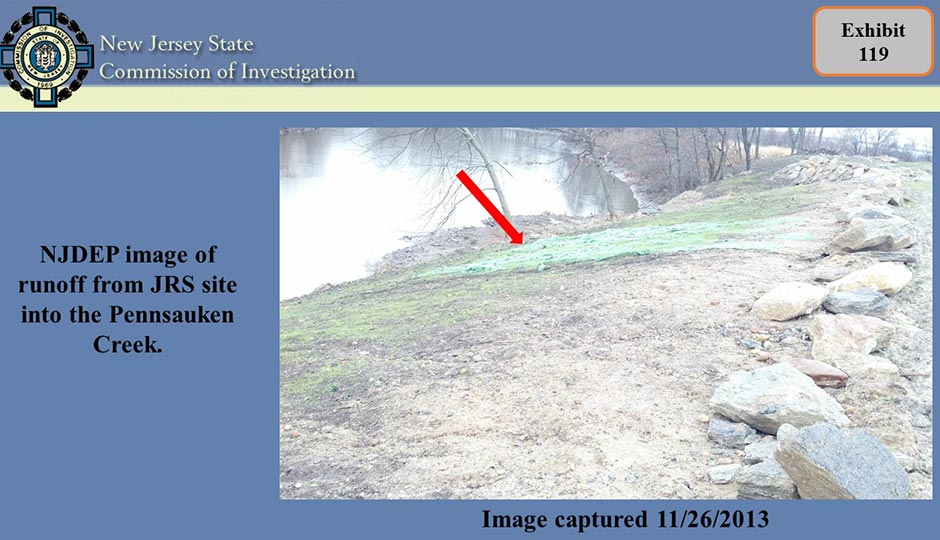Investigators: Organized Crime Dumping Dirty Dirt in New Jersey

Jersey Recylcing Services Palmyra site. Photo via New Jersey State Commission of Investigation
The New York mob is cashing in on New Jersey’s loopholes in recycling regulations — and it’s costing both the environment and residents, according to investigators from New Jersey’s State Commission of Investigation.
At a three-hour hearing held Wednesday at the Statehouse in Trenton, investigators said organized criminals are profiting from an underground economy via the improper disposal of contaminated soil and construction debris from New York. A few recycling sites and makeshift dumping grounds in South Jersey are particularly notable, according to the Inquirer.
It’s prompted the SCI to inspect the state’s recycling industry, which has it says been tainted by organized crime for years.
Unlike solid-waste haulers, what investigators called rogue “dirt brokers” in New Jersey are not subject to licensing requirements — not even to background checks. Through this loophole, they say, brokers can hire truckers to haul contaminated soil. The soil is distributed to unauthorized locations in New Jersey, including a few notable sites in South Jersey.
It’s a pattern that the commission’s acting executive director, Lee C. Seglem, said has allowed a small recycling center in South Jersey (one that’s “within shouting distance of the Delaware River”) to become a sprawling landfill strewn with “acres” of construction debris.
This is apparently nothing new — it’s been happening for years. SCI conducted a similar investigation in 2011.
One 100-acre site operated by Jersey Recycling Services in Palmyra (next to the Pennsauken Creek) was authorized by the state to accept 20,000 cubic yards of leaves and vegetation. But according to investigators, the site’s owner, Bradley Sirkin, allowed for 19 times that amount of contaminated soil, concrete and other materials — none of which they say he had a permit to process.
Some soil, like that taken from a Camden Community Charter School construction site and a New Brunswick development, contained levels of PAHs, a carcinogen that exceeded safety thresholds for residential areas.

Photo | New Jersey State Commission of Investigation
The Department of Environmental Protection found runoff from the Palmyra site into the Pennsauken Creek in 2013. By the time the NJDEP sent a notice of violations to Sirkin (who investigators said is related to a member of the Lucchese crime family in New York and has a relationship with a high-ranking member of the Philadelphia mob, according to the Inquirer), he’d moved to Florida.
Senior special agent Michael Dancisin testified that alleged dirt broker Frank Gillette collected payments from Palmyra’s Jersey Recycling Services, though it’s not clear how much.
Both Gillette and Sirkin were served subpoenas to testify at yesterday’s hearing, but both asserted their Fifth Amendment right against self-incrimination (only Gillette showed).
Gillette is also accused of being involved in the dumping of contaminated, carcinogen-containing material in the Cliffwood Beach section of Old Bridge Township along with another alleged dirt broker, Gregory Guido. Such chemicals are airborne and could run off into Raritan Bay, which is near the beach.
It’s a process that — if done properly — could have cost close to half a million dollars, SCI special agent Joseph Bredehoft said. Now, a township remediation project at the site will cost taxpayers $250,000.
The SCI is continuing its investigation.
Follow @ClaireSasko on Twitter.


